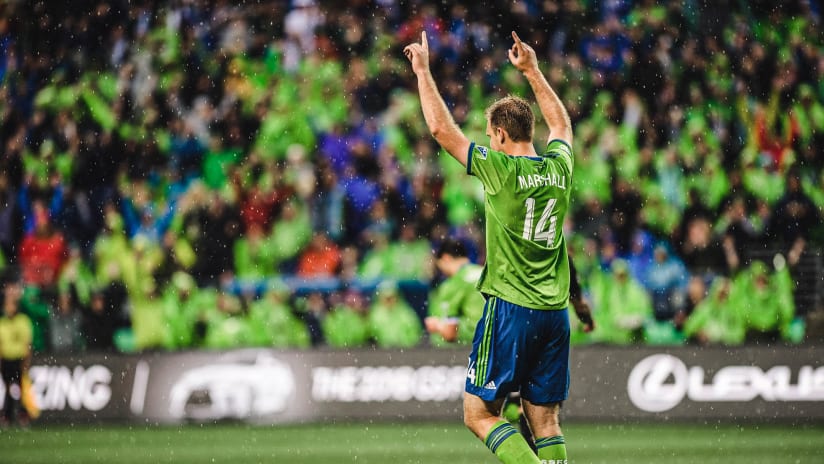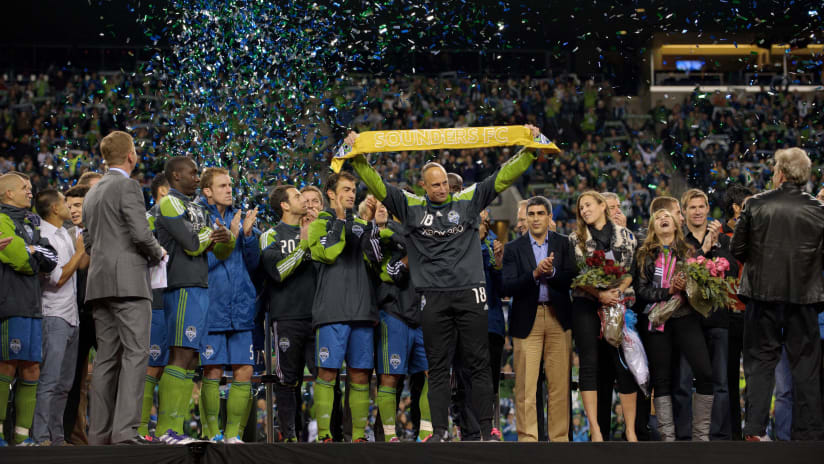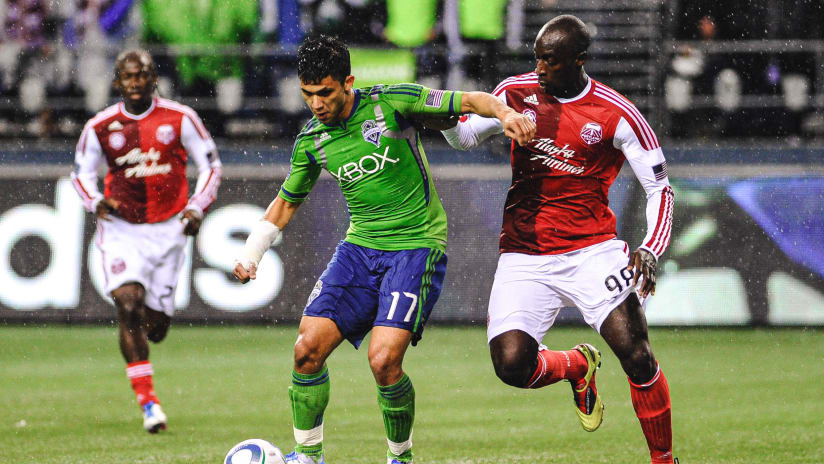Portland legend Clive Charles had a profound impact on soccer throughout the Pacific Northwest region and beyond. Eight years after his passing, former players still have coach Charles on their mind.
(Photos courtesy of University of Portland and Portland Timbers)
When Kasey Keller takes the field at Jeld-Wen Field on Sunday, he will look to the northeast stands and get inspiration.
It won’t be the fans, though, but rather the retired jersey of Clive Charles, the legendary University of Portland coach and former Timbers defender who Keller credits for much of his success as a professional.
“For no other reason, I love to play there to see Clive’s name up in the stadium,” Keller said. “It’s a huge honor for myself to have been a part of anything Clive was a part of.”
Charles played in Britain for West Ham United and Cardiff City, where his charismatic leadership earned him the captaincy at the age of 23. In 1978, he came to the Timbers, where he played until injuries started to limit his abilities and he retired from the outdoor game in 1981.
With the closing of that door came the opening of the door that would lead him to his tremendous coaching career. He started off at Reynolds High School in Troutdale, Oregon, before the University of Portland hired him in 1986. He remained there until his death in 2003, also taking on the women’s program in 1989 and developing them into a perennial powerhouse.
While there, he coached US internationals like Keller and Steve Cherundolo, as well as several others who went on to tremendous MLS success like Conor Casey and Sounders FC forward Nate Jaqua.
To a man, everyone who encountered him had a personal tale to tell of how he touched their lives.
Keller played for Charles from 1988-1991 before playing in Europe for 17 years, then coming to the Sounders FC for the final three years of his career. It was his time with Charles that best prepared him to be a pioneer of American soccer in Europe.
Before an important playoff game, Keller, an All-American that season, was kicked out of a practice session and had to meet with Charles and atone for his mistake before he was allowed back on the field.
“That was why when I got to Europe I was ready to go. If I had done certain things and not listened to Clive, like I said, I wouldn’t be the pro or person that I’ve been,” Keller said. “I’ve been very fortunate through my life that I haven’t lost a lot of people close to me. Clive is one of the people that I miss every day. A huge, huge reason why I'm still playing today is because what I learned from Clive at my time at UP.”
Jaqua played at the University of Portland from 2000-2002 and credits Charles with giving him the foundation for his nine years as a professional as well.
“He was calm and composed. He always knew what was going on and how to solve a situation. He could so clearly explain what is going on in a game and what needs to be done. The way he understood the game was amazing,” Jaqua said. “He creates an atmosphere where you have to be honest. I used to dribble a lot, but he taught me to do the simple things. Soccer is a simple game. Knowing that helped me transition and play as long as I have.”
“Because of Clive’s coaching technique, his players are good at independent thinking because Clive allowed them to express themselves on the field and to think on the field,” Schmid said. “Sometimes coaches over-coach and try and tell every player what to do when something happens. Then that player never looks to the cues in the game, he waits to hear the voice from the side. Clive’s players understood to look for the cues that were happening in the game. They weren’t waiting for his voice to tell them what to do.”
Sounders FC director of youth development Darren Sawatzky played at Portland from 1991-1994 and went on to play nine professional seasons. He credits Charles with laying the groundwork for the Sounders FC development program.
“My entire philosophy in the youth system with the Sounders is based on what I learned from Clive Charles,” Sawatzky said. “Outside of my own dad, he was the best male mentor I had in my life. I was very lucky to spend a ton of years with him.”
Most notable to Sawatzky was his belief in working closely with every player on the team, from the star to the last player. The relationships went far beyond the field though. Until his death in 2003, Sawatzky called him frequently to seek advice, but also just to chat.
“Clive had a way of having a personal relationship with every person in his life,” he said. “He was very affective as a coach because he knew who you were as a person.”
Wade Webber played for Charles in his first three seasons at Portland, reaching the Final Four in his senior season in 1988. He went on to play eight seasons as a professional, including stints with both the Timbers and Sounders before spending three years in MLS with the Dallas Burn and Miami Fusion.
After his retirement, he coached and was a teacher for ten years at Thomas Jefferson High School in Federal Way before becoming a full-time coach for Washington Premier Football Club.
“I don’t necessarily pattern myself after him as a coach, but I do find myself reflecting at times on the things he did which were best. He was an authority figure without using threats or fear. He learned from his own mistakes,” Webber said. “He would experiment a lot in those early years. Sometimes they would go horribly wrong, but he was willing to change and evolve.”
Webber noted that Charles could get his point across without raising his voice. This was most useful on the bench, where he typically stayed on the bench and talked only to his own players.
“He would just raise an eyebrow at a linesman and convey the message he meant to get across,” Webber said.
That type of control and respect garnered the same type of respect from his colleagues in college coaching.
Peter Fewing frequently matched up his Seattle University side against the University of Portland, taking his team south on I-5 to face the Pilots with regularity.
In one of their last such meetings, Charles walked over to the Seattle University bench where Fewing was addressing his team. In front of the entire team, Charles paid Fewing a great compliment and walked away.
“I later found out that he was sick,” Fewing said. “That was his way of saying goodbye.”
“You’re not going to be up 4-0 today,” Charles quipped back. Then he added, “Put him in in the second half and we’ll play 12 against 11.”
Fewing was awed by the gesture and Charles let his team and the officials know of the plan. Unfortunately, Jenkins was not well enough to play in the match, but the gesture was not lost on Fewing.
“That’s who Clive Charles was,” Fewing said, holding back his emotions. “He was an icon.”
Alan Hinton faced off against Charles as a player and dealt with him regularly as a coach. He remembered Charles as an attacking left back who ran the line – well ahead of his time for that position.
As a coach, Hinton thought Charles had what it takes to be successful in England, even suggesting that he return to his London roots to coach in the big leagues.
However, Charles replied that Portland had been far too good for him to leave.
Now, eight years after his death, soccer in Portland has taken the national stage, particularly with the match on Sunday between the Sounders FC and Timbers that will be broadcast nationally on ESPN.
“The one thing for sure with the rebirth of this game and particularly with the game in Portland, a lot of us will be thinking the same thing,” Hinton said.
“Clive would have loved this.”




